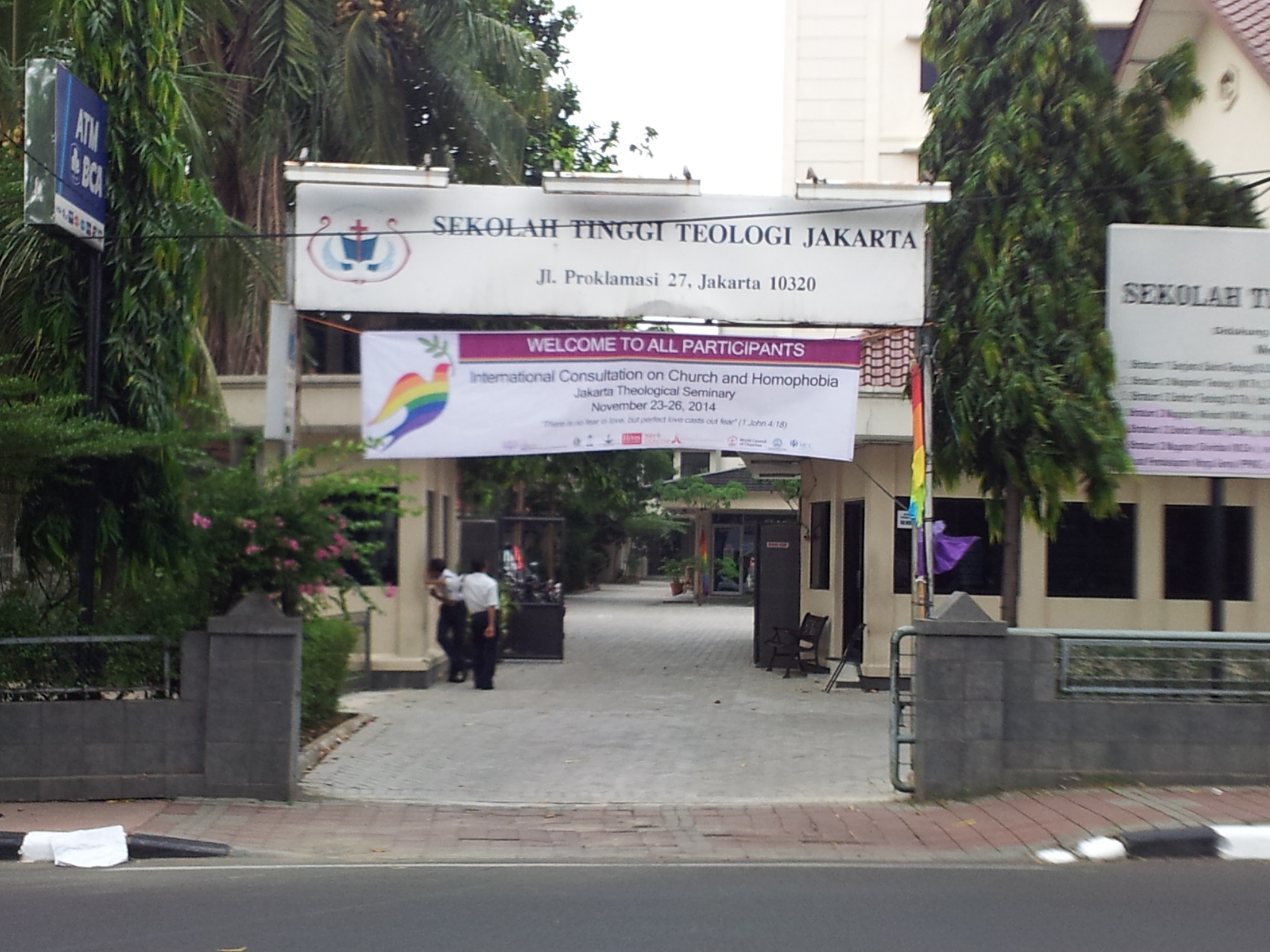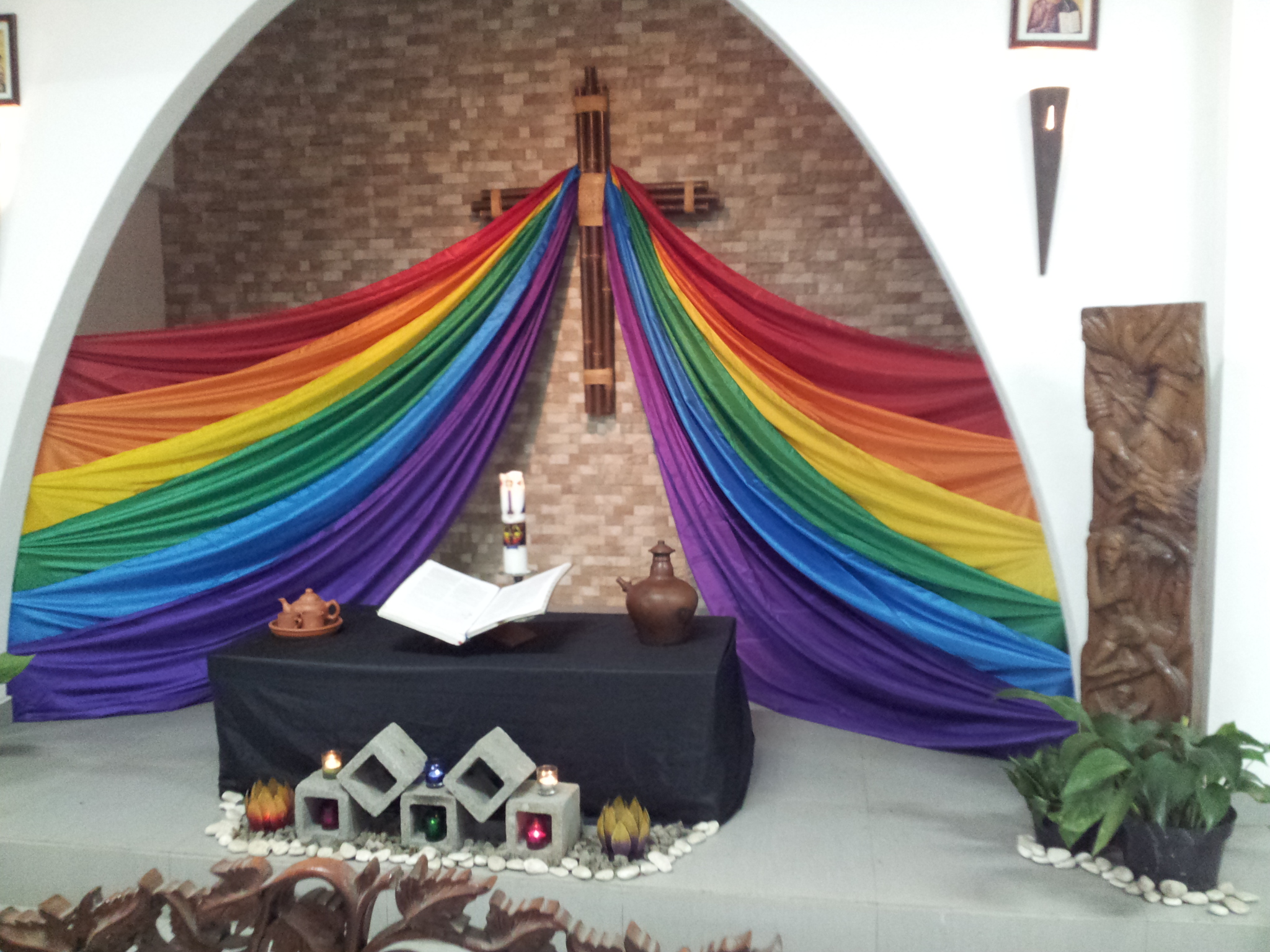Proceedings of the International Consultation on Church and Homophobia, held in the chapel of the Jakarta Theological Seminary. Photo credit: Joseph N. Goh.
An International Consultation on Church and Homophobia (ICCH) was held at the Jakarta Theological Seminary (JTS) in Jakarta, Indonesia from November 23 to 26, 2014. This consultative conference was co-organised by JTS, the National Council of Churches in India, the Theological Department of the Christian University of Duta Wacana, the Communion of Churches of Indonesia, the Fellowship of Women Theologians, the World Student Christian Federation-Asia Pacific, and the Christian Conference of Asia. The conference sought to introduce LGBT issues and queer theology to its participants and enable them to reflect on God’s work in embracing those marginalised by church and society. Taking 1 John 4:18 as its theme, the conference aimed at assisting pastors, seminary lecturers, church leaders and representatives of other organisations in meditating on God’s call to accept and love all human beings, including those who have different sexual orientations, gender identities and gender expressions. Approximately 60 participants from Angola, Germany, Hong Kong, India, Indonesia, Jamaica, Malaysia, the Philippines, Singapore, Togo and the United States took part in the ICCH.
In the late afternoon of Sunday, November 23, the opening ceremony of the ICCH was held at the JTS chapel. Attendants were led through a prayer service comprising hymns and reflections that celebrated the gifts of diversity and inclusiveness. During the service, Rev. Dr Septemmy Lakawa of JTS provided a powerful meditation on the theme of the ICCH. Lakawa stated that “the challenge for us today is to identify how…our theological discourse and doctrines have become the embodiment of the fear of difference, rather than the embodiment of the perfection of love.” In the evening, Rev. Dr Donald E. Messer, President Emeritus of the Iliff School of Theology, Denver, Colorado, delivered his keynote address entitled “Breaking the Conspiracy of Silence on LGBT Issues.” Messer noted how “a theology of exclusion and hate has triumphed over a theology of inclusion and love.”

Photo credit: Joseph N. Goh.
On Monday, November 24, Indonesian LGBTIQ activist Dr Dédé Oetomo delivered a presentation that examined the LGBT movement in Indonesia and the involvement of religions. He gave a historical summary of the formation of groups such as the Himpunan Wasam Djakarta (Jakarta Association of Transgender Women) in the 1960s, the Persatuan Waria Kota Surabaya (Surabaya City Association of Transgender Women) in 1978, Lambda Indonesia in 1982, Persatuan Lesbian Indonesia in 1986, and GAYa NUSANTARA in 1987. In the ensuing session, Dr Siti Musdah Mulia of Indonesia presented a Muslim view on sexual minorities. Mulia mentioned the irony that “human rights defenders are still homophobic.” As conservative Islamic interpretations condemn LGBTIQ identities and practices, Mulia proposed a recognition of sexuality as a positive aspect of human life. She questioned conservative, homophobic interpretations of the Qur’an, which she cited as “the big obstruction of LGBT in Islam.” The third session of the day, “Understanding Sexual Orientations and Gender Identities and Expressions (SOGIE)” was presented by Indonesian LGBTIQ activist Yulita Molyganta who used the Genderbread Person image to expound her points.
Four parallel workshops were held in the afternoon. These included Rev. Dr Donald E. Messer’s workshop on “Ministering to LGBT People,” Indonesian psychologist Danny Irawan Yatim’s workshop entitled “Remaja, Keluarga dan Seksualitas” (Youth, Family and Sexuality), Dr Septemmy Lakawa’s examination “Seks, Cinta dan Tubuh” (Sex, Love and the Body), and testimonies by several members of the LGBT communities in Jakarta. In the late afternoon, Dr Bambang Subandrijo from JST delivered a paper entitled “Christian View on Sexual Minorities.” He asserted that “there is no passage of the Bible that speaks about LGBTIQ explicitly and specifically,” and that “LGBTIQ is not one’s will and choice, but a gift of God that should be accepted as it is.” The last session for the day consisted of a panel comprising Rev. Philip Vinod Peacock, Rev. Dr Vincent Rajkumar and Rev. Christopher Rajkumar from India. They aired some issues on homophobia and the “clobber” passages from the Bible, the role that churches can play in addressing homophobia and inculcating healthy attitudes towards sexuality, homosexuality as a challenge to the patriarchal, heteronormative, capitalist modern state, and ecclesiastical issues on homosexuality in Indian contexts.
On the morning of Tuesday, November 25, Indonesian activist and academic Dr Gadis Arivia delivered her presentation entitled “Love is a Human Right.” She cited several regional and international documents on SOGIE and same-sex marriage rights, and spoke on the need to foster a “human rights culture.” A “talk-show” style panel session was held in the late morning with life sharings from Rev. Vinod Wesley and Rev. Esther Bharathi. Bharathi, the first transwoman Christian pastor in India, spoke on the difficulties of her journey in her theological college and her vision of God. Wesley also spoke on how the presence of Bharathi provoked a rethinking of “body hermeneutics” and theologies of sexuality among the seminarians. Wesley highlighted the need for the emergence of a “theology of life” that unconditionally embraces all persons. In her presentation, entitled “Bisexuality: Making the ‘B’ Visible in the Christian Community,” Pearl Wong, from Queer Theology Academy in Hong Kong, asserted that “heterosexism is the root of homophobia and biphobia.” Wong called for theologisings from diverse perspectives that take human realities and experiences seriously into consideration.
Four concurrent workshops were held in the afternoon after lunch. Rev. Miak Siew and Pastor Pauline Ong of Free Community Church, Singapore engaged with 20 participants on “Being an Open and Welcoming Church.” Indonesian LGBTIQ activist King Oey’s workshop was entitled “Kekerasan Terhadap LGBT” (Violence against LGBT). Indonesian feminist theologian Dr Asnath Natar delivered a workshop on pastoral counselling for families with LGBT entitled “Konseling Pastoral untuk Keluarga dengan LGBTIQ” (Pastoral Counselling for Families with LGBTIQ). Indonesian pastor Melinda Siahaan’s workshop, “Dari Teologi Feminis menju Teologi Queer” (From Feminist Theology to Queer Theology) looked at directions from feminist theology to queer theology. Finally, suicide prevention advocate Benny Prawira conducted a workshop on the issue of suicide among LGBTIQ persons. The afternoon continued with a panel comprising Rev. Christopher Rajkumar of India and Rev. Stephen Suleeman of Indonesia who shared about their journeys of being allies to gender-varied and sexually diverse persons. After dinner, participants were treated to several performances by young Indonesian transwomen who wowed the captive audience with their talent.
Photo credit: Joseph N. Goh.
The final day of the ICCH on Wednesday, November 26, commenced with Rev. Philip Vinod Peacock’s presentation entitled “Qu(e)erying Asian, Qu(e)erying Theology.” He examined the effects of colonialism, the construction of bodies, capitalism, violence and doing (queer) theology in Asia. Peacock stressed that “love does not just blur boundaries, it smashes them.” Thereafter, in his presentation entitled “Compassion for Ourselves & Ourselves Along the Way to LGBT Justice,” US-based human rights advocate Dr Michael J. Adee argued that storytellings and accounts of real-life journeys can help change the minds of those who are antagonistic towards LGBTIQ people. The third presentation was entitled “Tongzhi Theology: A Queer Theology for Asians,” and was delivered by Malaysian-born, US-based Rev. Dr Ngeo Boon Lin. Ngeo spoke on the intersections of tongzhi persons, process theology and Confucianism. In the afternoon, Rev. Miak Siew of Singapore combined theology and pastoral care in his presentation, “Queer Lessons for Churches on the Straight and Narrow.” Siew advocated the church or “Beloved Community” as “a glimpse of the Commonwealth of God [as] a place for all people.” Rev. Joseph N. Goh’s presentation, “The Sexual Body as Locus Theologicus,” was the final talk for the day. Goh, a Malaysian, proposed that theologies seriously consider the lived realities of non-heteronormative persons as potential valuable theological resources that echo God’s desire for all human persons to thrive.
The ICCH ended with a closing service and holy communion at the JTS chapel, which was presided over by Rev. Miak Siew and Pastor Pauline Ong of Singapore. Bread was broken and shared over an open table. Finally, the participants unanimously supported a final statement that emanated from the ICCH.
I wish to acknowledge the kind assistance of Rev. Stephen Suleeman in preparing this report.
___
Joseph N. Goh is currently pursuing a Ph.D. in Gender, Sexuality and Theology with the School of Arts and Social Sciences at Monash University, Malaysia. He holds a Licentiate in Sacred Theology (S.T.L.) from the Jesuit School of Theology of Santa Clara University in Berkeley, CA. An ordained minister with the North American Catholic Ecumenical Church (NACEC), Goh is also a member of the Emerging Queer Asian Pacific Islander Religion Scholars (EQARS) and the editor of the Queer Asian Spirit E-Magazine (QAS E-Zine).
Copyright © 2014 Joseph N. Goh. All Rights Reserved.



